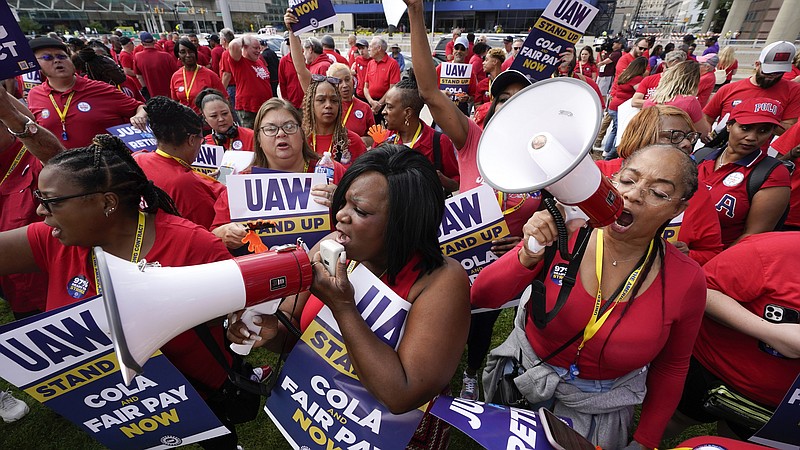Two of President Joe Biden’s top goals — fighting climate change and expanding the middle class by supporting unions — are colliding in the key battleground state of Michigan as the United Auto Workers go on strike against the country’s biggest car companies.
The strike involves 13,000 workers so far, less than one-tenth of the union’s total membership, but it’s a sharp test of Biden’s ability to hold together an expansive and discordant political coalition while running for reelection.
Biden is trying to turbocharge the market for electric vehicles to reduce greenhouse gas emissions and prevent China from solidifying its grip on a growing industry. His signature legislation, known as the Inflation Reduction Act, includes billions of dollars in incentives to get more clean cars on the roads.
As a result of the act and shifting demand, Ford, GM and Stellantis are investing billions to retool their sprawling operations to build electric vehicles, which are critical to addressing climate change. But they are making little if any profit on those vehicles, while Tesla, which dominates electric-car sales, is profitable and growing fast.
Ford said in July that its electric-vehicle business would lose $4.5 billion this year. If the union got all the increases in pay, pensions and other benefits it is seeking, the company said, its workers’ total compensation would be twice as much as Tesla’s employees.
Union demands would force Ford to scrap its investments in electric vehicles, Jim Farley, the company’s CEO, said in an interview Friday. “We want to actually have a conversation about a sustainable future,” he said, “not one that forces us to choose between going out of business and rewarding our workers.”
For workers, the biggest concern is that electric vehicles have far fewer parts than gasoline models and will render many jobs obsolete. Plants that make mufflers, catalytic converters, fuel injectors and other components that electric cars don’t need will have to be overhauled or shut down.
Many new battery and electric-vehicle factories are springing up and could employ workers from the plants that have shut down. But automakers are building most aggressively in the South, where labor laws would work against union organizers, rather than in the Midwest, where the UAW has more power. One of the union’s demands is that workers in the new factories be covered by the automakers’ national labor contracts — a demand that the automakers have said they can’t meet because those plants are owned by joint ventures. The union also wants to regain the right to strike to block plant shutdowns.
“We are at the dawn of another industrial revolution, and the way we’re going is the way we went in the last industrial revolution — a lot of profit for a few and misery and not good jobs for the many,” said Madeline Janis, executive director of Jobs to Move America, an advocacy group that works closely with the UAW and other unions.
“The UAW is really taking a stand for communities across the country to make sure this transition benefits everybody,” Janis added.
Automakers have been racking up record profits during the past decade, but losing time to Tesla and foreign automakers could potentially be devastating during the stoppage.
The three companies are already struggling to get their electric-vehicle business going. A new GM battery factory in Ohio has been slow to produce batteries, delaying electric versions of the Chevrolet Silverado pickup and other vehicles. Ford had to suspend production of its electric F-150 Lightning in February after a battery caught fire in one of the pickups that was parked near the factory for a quality check. And Stellantis won’t even begin selling fully electric vehicles in the United States until next year.
Those problems and Tesla’s growing sales could put the union in a strong position to extract a good deal.
“The president is in a really tough position,” said Erik Gordon, a professor at the University of Michigan’s Ross School of Business. “What he needs to be the most pro-labor president ever and the greenest president ever is a magic wand.”
Brittany Eason, who has worked for 11 years at the Ford Assembly Plant in Wayne, Mich., said workers are worried that they’ll “be pushed out by computers and electric vehicles.”
“How do you expect people to work with ease if they’re in fear of losing their jobs?” said Eason, who planned to walk the picket line this weekend. Electric vehicles may be inevitable, she said, but changes need to be made “so everybody can feel secure about their jobs, their homes and everything else.”
BIDEN EFFORTS
Biden on Friday acknowledged the tension in remarks from the White House, saying the transition to clean energy “should be fair and a win-win for autoworkers and auto companies.”
As part of its demands, the UAW wants to represent employees at battery plants, which would send ripple effects through an industry that has seen supply chains upended by technological changes.
“Batteries are the power trains of the future,” said Dave Green, a regional director for the union in Ohio and Indiana. “Our workers in engine and transmission areas need to be able to move into the new generation.”
Executives, however, are keen to keep a lid on labor costs as their companies prepare to compete in a global market. China is the dominant manufacturer of electric vehicles and batteries.
“The UAW strike and indeed the ‘summer of strikes’ is the natural result of the Biden administration’s ‘whole of government’ approach to promoting unionization at all costs,” said Suzanne Clark, CEO of the U.S. Chamber of Commerce.
Some environmental groups, aware of how labor remains crucial to securing support for climate programs, have expressed support for the strike.
“We’re at a really pivotal moment in the history of the auto industry,” said Sam Gilchrist, deputy national outreach director at the Natural Resources Defense Council.
Presidential politics have increased the stakes for the strike, which could damage the economy going into an election year, depending on how long it lasts and whether it spreads. It’s also centered in Michigan, a key part of Biden’s 2020 victory and critical to his chances at a second term.
Former President Donald Trump, the front-runner for the Republican nomination, sees an opportunity to drive a wedge between Biden and workers. He issued a statement saying Biden “will murder the U.S. auto industry and kill countless union autoworker jobs forever, especially in Michigan and the Midwest. There is no such thing as a ‘fair transition’ to the destruction of these workers’ livelihoods and the obliteration of this cherished American industry.”
In an interview with NBC’s “Meet the Press,” Trump said that “electric cars are going to be made in China,” not the United States, and he said “the autoworkers are being sold down the river by their leadership.”
Trump’s comments have not earned him any support from Shawn Fain, president of the UAW.
“That’s not someone that represents working-class people,” he told MSNBC earlier this month. “He’s part of the billionaire class. We need to not forget that. And that’s what our members need to think about when they go to vote.”
Ammar Moussa, a spokesperson for Biden’s campaign, said Trump “will say literally anything to distract from his long record of breaking promises and failing America’s workers.” He noted that Trump would have let auto companies go bankrupt during the financial crisis rather than bail them out as President Barack Obama did at the time.
But there are also disagreements between Biden and workers.
When the Energy Department announced a $9.2 billion loan for battery plants in Tennessee and Kentucky, part of a joint venture by Ford and a South Korean company, Fain said the federal government was “actively funding the race to the bottom with billions in public money. “
Madeline Janis, co-executive director of Jobs to Move America, which works on environmental and worker issues, said the White House needs to do more to alleviate labor challenges.
“We don’t have enough career pathways for people to see themselves in this future and let go of the jobs in industries that are causing our world to be in crisis,” she said.
Adjusted for inflation, wages for autoworkers in the United States have fallen 19% since 2008, according to the Economic Policy Institute, a left-leaning research group.
At the same time, union officials are aware of the changes in the industry and have said they do not want to handicap GM, Ford and Stellantis as the companies try to recover ground they have lost to Tesla, which has aggressively resisted attempts to unionize its factories. The Detroit carmakers also face challengers like Rivian, a startup that makes electric pickups and sport utility vehicles in Illinois, as well as foreign-owned rivals such as Mercedes-Benz and Toyota, whose U.S. factories, mostly in the South, are not unionized.
“That’s the biggest challenge here,” said Karl Brauer, executive analyst at online marketplace iSeeCars.com, “trying to commit to a long-term contract in an industry that is very uncertain and unpredictable over the next five years.”
Information for this article was contributed by Chris Megerian and Joey Cappelletti of The Associated Press and by Jack Ewing of The New York Times.
This article is originally published on arkansasonline.com







